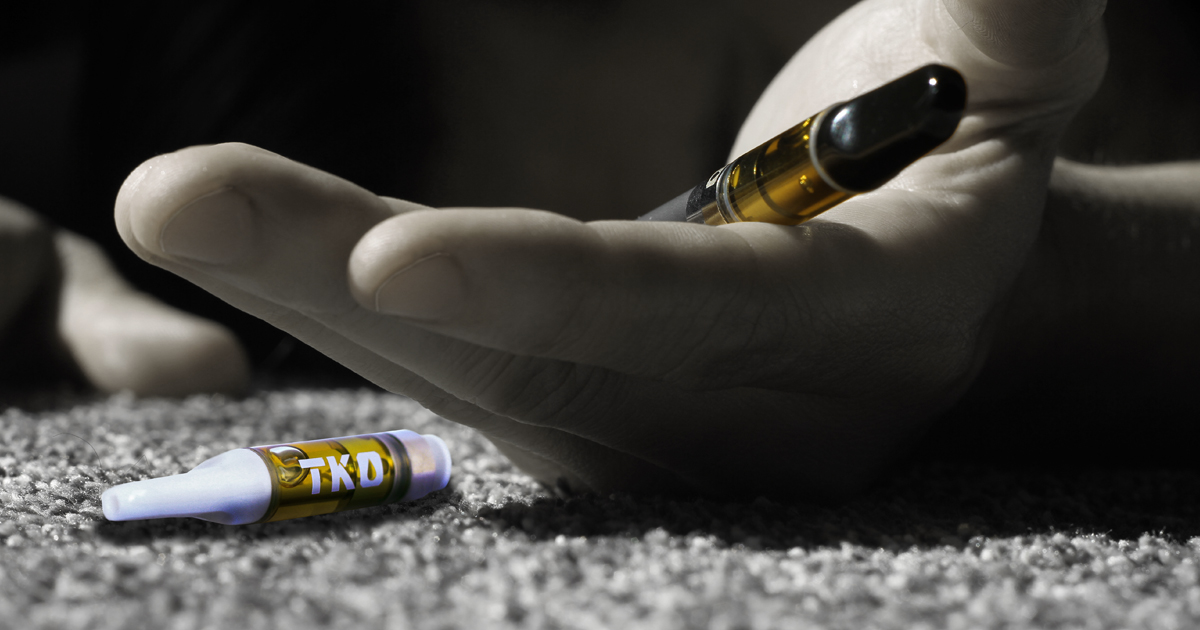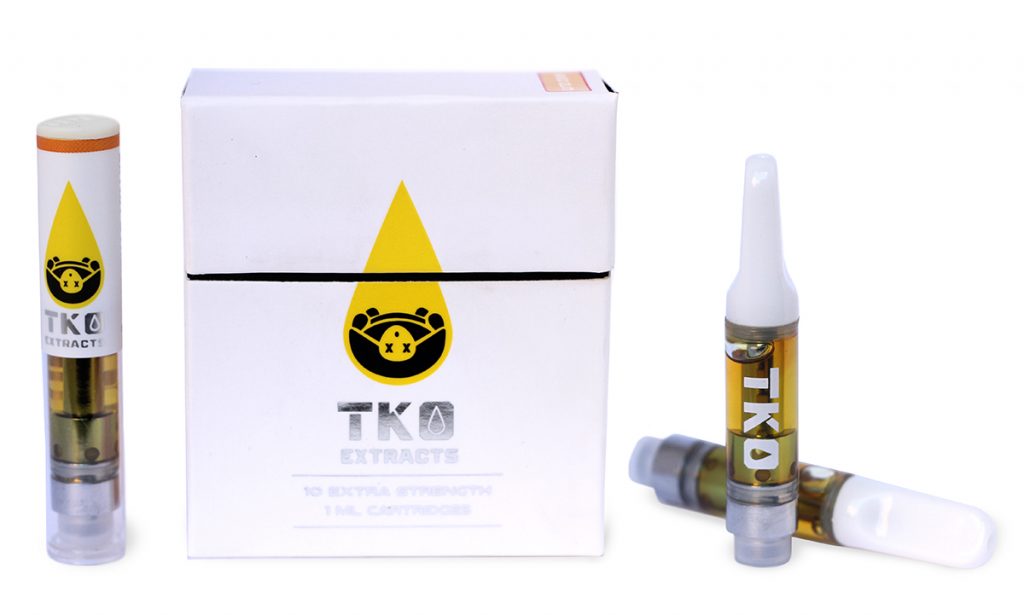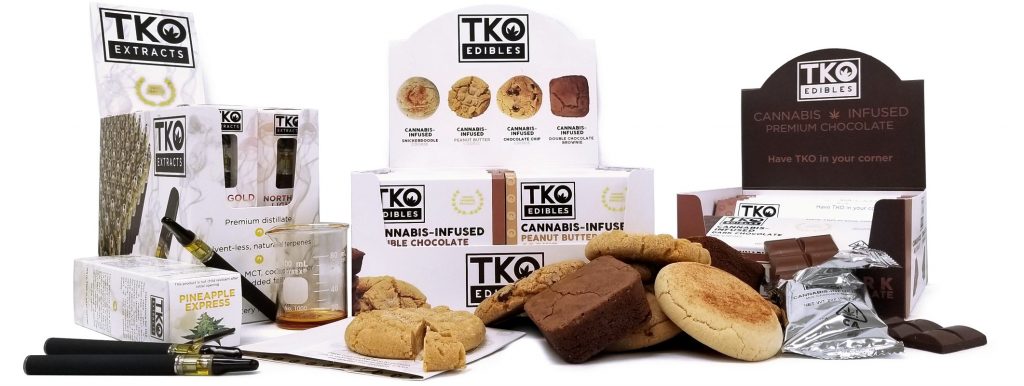How to Spot a Fake Vape Cart Before It’s Too Late

Cannabis consumers are crazy about their vape pens. And that demand is huge, and growing. According to cannabis market research group Arcview Market Research in partnership with BDS Analytics, the cannabis concentrates market was worth nearly $3 billion in 2018, an increase of 49 percent from the previous year. Vaping is leading the surge, with 58 percent of concentrate sales coming from prefilled vaporizers.
However, over the past few months, more than 450 people have been sickened with lung problems linked to contaminants in illicit market vape carts. As of press time, seven people have died from complications, exhibiting symptoms similar to lipoid pneumonia, a rare inflammatory condition found when fat particles enter the lungs. Hospitalized patients — many of them young and healthy — have reported difficulty breathing, nausea, vomiting, diarrhea, fatigue, weight loss and coughing up blood.
In response, President Donald Trump announced that he is working to finalize a ban on flavored e-cigarettes. The problem? It may be drug policy, not flavored e-cigs, that is really responsible for the rash of respiratory-related illnesses. Aaron Smith, executive director of the National Cannabis Industry Association (NCIA), an advocacy organization working to promote the growth of a responsible and legitimate cannabis industry, believes that the reported illnesses and deaths are a predictable consequence of federal prohibition. “These policies are directly bolstering the markets for untested and potentially dangerous illicit products,” he said.
AARON SMITH: “These policies are directly bolstering the markets for untested and potentially dangerous illicit products.”
Even though cannabis is legal in 11 states and the District of Columbia, the majority of Americans do not have access to legal marijuana products. And in this regulatory void, black markets continue to thrive and bootleggers flourish as counterfeit products take up the slack to meet consumer demand.
A lot of consumers prefer vaping to smoking. Vaping is discreet, doesn’t leave a skunky smell and is easy to enjoy at home or around town: just hold the pen to your lips and inhale, no matches or lighters required. But some consumers may be trading convenience for safety. To avoid the extra costs imposed by taxes levied on legal cannabis purchases, consumers have looked to the illicit market for relief. Even in cannabis-legal states like California, black markets thrive. It’s cheaper, but it’s dangerous.
Bootleg Products

Fake TKO Cartridges (above) do not even use the same logo as the authentic brand.
To test how easy it is to buy a vape cart online, your author, who does not have access to legal cannabis, opened the Instagram app, searched related terms and was directed to a very legitimate-looking site (that shall remain unnamed). Just a few clicks in and I had amassed a shopping cart full of Kingpen vape carts that could be delivered straight to my door. Were these authentic Kingpen vape carts? Probably not.
Kingpen isn’t the only brand name with knock-offs on the market. Connected Cannabis Co., Heavy Hitters, West Coast Carts, Mario Carts, TKO, Bulletproof Vapes and Brass Knuckles have taken huge hits courtesy of black market conmen and counterfeiters.
Two fake brands that have recently come under scrutiny are Dank Vapes and Chronic Carts. News site Inverse picked up on the Dank Vapes angle about a month ago, noting that both «companies» had built a veneer of credibility from official-looking logos, t-shirts and active social media accounts.

Real TKO products only come in the packaging above.
However, Mark Hoashi, founder of the Doja app, told Inverse that Dank Vapes is not a cannabis company that operates as an actual facility, but a packaging company. “These are people just filling cartridges as ‘Dank Vapes,’” he said. “It’s just people in their garages filling them and selling them.”
For obvious reasons, black market products bypass the scrutiny and testing applied to products from legal, regulated markets. Enter synthetic vitamin E oil (tocopheryl-acetate). Investigators in New York have turned their attention to the additive, a cheap diluent added to vape carts to thicken the oil. For THC vape carts, quality is judged partially by the thickness of the oil.
Vitamin E, frequently found in beauty products, food, and nutritional supplements, is safe when consumed or applied to the skin in moderation. However, from what we know about vitamin E acetate, inhalation of the compound may be a leading contributor to the spike of lung-related illnesses and deaths.
A recent report published in the New England Journal of Medicine found that marijuana vaping was linked to 84 percent of reported cases of vaping-related illnesses in Illinois and Wisconsin.
More Than Just Vitamin E
Oleg MaryAces is the director of education and marketing at Lock & Key Remedies, a cannabis oil firm based in Brooklyn, New York. MaryAces has been working in the vape manufacturing business since 2012, a venture he began in China — where much of the fake vape hardware is manufactured — and MaryAces has concerns about illicit market vape pens that go beyond vitamin E acetate.
“Mold [in cannabis oils] can be a harmful/deadly problem that some growers/producers willfully ignore,” MaryAces wrote to Freedom Leaf in an email. He also points to an artificial flavoring, diacetyl, that the Centers for Disease Control and Prevention (CDC) has linked to lung disease. Another potentially harmful contaminant is pesticides.
One 2016 study conducted by a California-based cannabis testing lab found that 84 percent of cannabis oils tested contained unacceptable levels of pesticides. These pesticides are far more dangerous than pesticides consumed through unwashed produce. As cannabis consumers inhale, the action of combustion may expose the body to deadly chemicals like myclobutanil, a highly toxic fungicide that may be fatal if inhaled, swallowed or absorbed through the skin.
What You Can Do
If you do not live in a cannabis-legal state and are buying vape carts online, the smartest thing to do is to stop. The only way to avoid putting yourself at risk is to avoid buying on illicit markets.
Should you decide to buy from the black market anyway, spend some time researching the company and use common sense. If you come across a big name product with a price that seems too good to be true, it probably is. Most likely, a black market dealer purchased an empty vape cartridge from an e-commerce site like Alibaba, filling it with low quality, contaminated distillate.
Another tell is the quality of the packaging. If it looks unprofessional or has typos or other packaging and labeling mistakes, skip it.
Last but not least, check the quality and consistency of the oil. It should be fairly thick and move slowly when upside down. And if it tastes terrible, just throw it out.
If vape carts are your go-to consumption choice, consider switching to another consumption method, at least until the air clears. Dr. Diana Martins-Welch, a cancer and chronic pain specialist who has recommended medical cannabis to hundreds of patients told USAToday , “I would never have thought I’d be in a position to tell someone to smoke marijuana, but if the choice is between smoking and vaping, smoke marijuana.”
Related Articles
• Proposed U.S. Tariffs Threaten Vaporizer Industry

